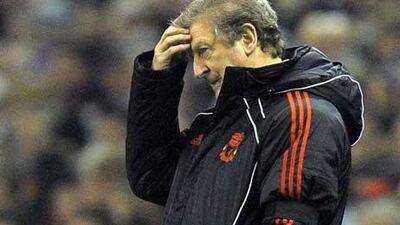To the names of Reading, Northampton and Blackpool can be added that of Wolverhampton Wanderers. Liverpool's horrendous 2010 can be measured by the unlikely victors at Anfield.
It concluded in suitably embarrassing fashion, Wolverhampton's first goal on the hallowed turf since 1984 earning an improbable win for a side who were bottom of the Premier League before the game.
But, as has been the case at Anfield for much of the last 18 months, much of the drama took place off the field.
The chant of "Dalglish" that is part nostalgia, part dissent was aired again. So was a new addition to the Kop's repertoire: "Hodgson for England."
Liverpool, as a city and as a club, has always had an ambivalent relationship with the rest of the country; now the majority would settle for Roy Hodgson managing anyone or anywhere else.
"The famous Anfield support has not really been there ever since I came here," he said afterwards.
Sounding like an attempt to blame the fans, it was not the wisest comment. However, it was in keeping with his general tone, an irritated refusal to understand that his decisions or position are subject to scrutiny.
And yet he has a valid point.
No other set of supporters has the reputation Liverpool's have earned for backing their managers. Yet it has helped that, of the previous eight appointments, two (Kenny Dalglish and Graeme Souness) were Liverpool legends as players; three more (Bob Paisley, Joe Fagan and Roy Evans) had contributed to success as long-serving members of the Boot Room.
Of the newcomers, Gerard Houllier was a devoted supporter for three decades before his arrival, Rafa Benitez won the Champions League in his debut season and Bill Shankly's charisma and catalytic impact soon made him a cult figure.
The fans did not turn on any of them so quickly. Then again, they rarely had reason to.
Objective analysis suggests Hodgson is looking for preferential treatment. With the exception of Souness, comparisons to any of the former managers do not flatter the incumbent.
It is not merely Liverpool's lowly league position (12th, at a club that has not finished in the lower half of any division for 57 seasons); it is the way that any sense of progress soon appears a mirage.
Consider the lame surrender at Stoke City, which followed a six-match unbeaten run, or Wednesday's tame display against Wolves, ending a sequence of four successive home league wins.
They are results to counter the theory that prolonged exposure to Hodgson's methods will transform Liverpool.
They also illustrate that, for all the indignities of Benitez's final season at Anfield, Liverpool are significantly worse this year.
They took 1.65 points per game in the Spaniard's most demoralising campaign and 1.22 this; a side with a negative goal difference recorded a surplus of 26 last year.
While discontent grows, it hardly helps Hodgson that "King Kenny" sits in the directors' box while, residing at his home in the Wirral, just outside the city, after his dismissal by Inter Milan, Benitez is the king over the water.
Yet the availability of popular predecessors is not the nub of the issue. The question for John W Henry, the new owner, is altogether simpler: is Hodgson the right man to take Liverpool forward?
A 63-year-old was never likely to be a long-term choice but, rather than stabilising the ship, he appears to have drilled more holes in it.
The cautious style of football has alienated supporters without producing results, and Liverpool's away record is abysmal.
Identifying a player who has performed to his potential under Hodgson is hard; David Ngog and Maxi Rodriguez may have produced the best form of their Liverpool careers, but that is not saying a great deal.
Nor are there reasons to be confident about giving Hodgson money to spend. He has suggested the fault for signing Joe Cole lies with the departed managing director Christian Purslow.
Two who definitely were his recruits are Christian Poulsen and Paul Konchesky, who both lack the class required. At 30 and 29 respectively, they have a rapidly decreasing resale value, which is an issue as New England Sports Ventures look to implement an economically sound model in the transfer market.
Of Hodgson's buys, only Raul Meireles has excelled, and not on the many occasions his manager has impeded him by picking him out of position.
So while some did not give him the benefit of the doubt, quite simply Hodgson has done too little to earn "the famous Anfield support".
So far, he has had the qualified backing of Henry and Tom Werner, the chairman. But as the consequences of failure become ever clearer - a possible failure to qualify for Europe, a lower income, the possible loss in the summer of Fernando Torres and Jose Reina - their decision becomes bigger.
And sacking Hodgson would be more popular than backing him.


